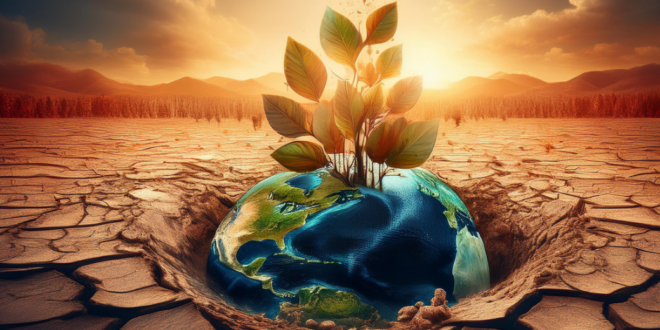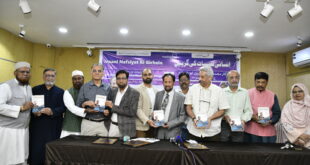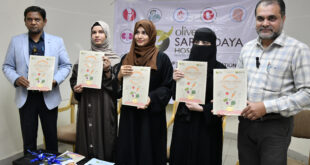By: Asad Mirza
International Labour Organisation’s (ILO) latest report reveals that half of the global population lacks social protection, exacerbating vulnerabilities amid the escalating climate crisis. Over 90% of individuals in climate-vulnerable countries are without any safety net, highlighting a critical gap in support for those most affected by environmental changes.
The ILO’s World Social Protection Report 2024-26: Universal social protection for climate action and a just transition, released last week states that around 50 per cent of the global population – which could be described as the privileged one, do have access to at least one social protection benefit – but 3.8 billion people globally lack any kind of safety net, including 1.8 billion children worldwide.
“Climate change does not recognise borders, and we cannot build a wall to keep the crisis out,” said Gilbert Houngbo, ILO Director-General. “The climate crisis affects us all and represents the single, gravest threat to social justice today.”
Findings showed that governments are failing to make full use of the powerful potential of social protection to counter the effects of the climate crisis and support a just transition to a greener future.
A ‘deeply divided world’
For the first time, more than half of the global population (52.4 per cent) has some form of social protection, climbing from 42.8 per cent in 2015, the year when the Sustainable Development Goals (SDGs) were adopted, according to the report.
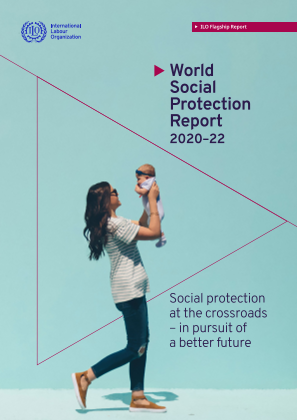
But, in the 20 most climate-vulnerable countries, 91.3 per cent of people – or 364 million – still go without any security net. More broadly, in the 50 most climate-vulnerable countries, 75 per cent of the population – or 2.1 billion people – lack any social or livelihood protection, provided by their governments.
“The stark disparity in the right to social protection is a reflection of our deeply divided world,” said Mia Seppo, ILO Assistant Director-General. “The most urgent challenge is protecting those at the frontline of the climate crisis.”
Globally, most children (76.1 per cent) still have no effective social protection coverage, and a substantial gender gap persists, with women’s effective coverage lagging behind men by 50.1 and 54.6 percent, respectively.
These gaps are especially significant, given the potential role of social protection in softening the impact of climate change, helping people and societies adapt to a new climate-volatile reality and facilitating a just transition to a sustainable future.
The ILO chief cautioned that many of the countries experiencing the most brutal consequences of this crisis are particularly ill-equipped to handle its environmental and livelihood consequences.
“We must recognise that what happens to impacted communities will affect us all,” Houngbo said.
How social protection helps
Social protection can help people adapt to and cope with climate-related shocks by providing social protection benefits, such as income security and access to healthcare, and cushion families, workers and enterprises during the green transition.

It can also enable more sustainable economic practices, including supporting employees with training and upskilling for employment in green and low carbon sectors.
“Social protection is essential to ensure that the ongoing green and low-carbon energy transition leaves no one behind,” Houngbo said. “The imperative to make social protection universal is not only ethical; it is also practical. By supporting and protecting workers everywhere, we can help to alleviate fears about the transition, which is essential to mobilise popular support for a sustainable and just transition.”, he further said.
Governments must step in
Despite its role as a catalyst and an enabler of positive climate action, governments are failing to make the most of social protection’s potential, largely because of persistent coverage gaps and significant underinvestment, the new report found.
On average, countries spend 12.9 per cent of their gross domestic product (GDP) on social protection, excluding health. However, while high-income countries spend an average of 16.2 per cent, low-income countries allocate only 0.8 per cent of their GDP to social protection.
Low-income countries, including the most climate-vulnerable States, need an additional $308.5 billion a year, or 52.3 per cent of their GDP, to guarantee at least basic coverage and international support will be needed to reach this goal.
‘Time to up the ante’
The ILO report calls for decisive and integrated policy action to close protection gaps, arguing that, “it is time to up the ante” and invest significantly in social protection.
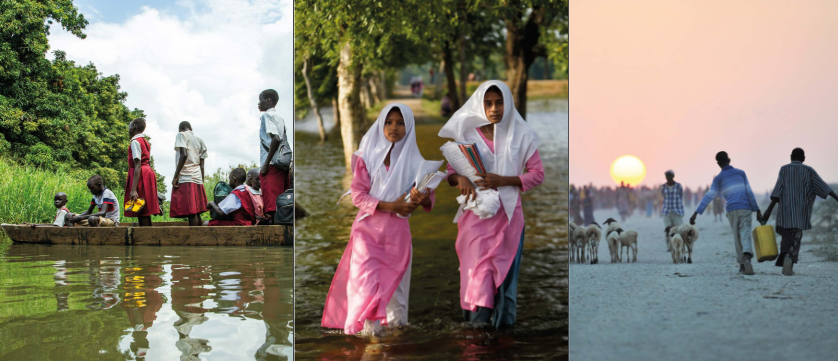
Recommendations to help guide policy and ensure effective and sustainable outcomes include preparing for both “routine” life cycle risks and climate-related shocks with social protection systems and using social protection to support climate change mitigation and adaptation efforts while securing public acceptance of those measures.
The report also recommends prioritising investment in social protection, including external support for countries with limited fiscal space.
Need to focus on Social Protection
Social protection also contributes to raising adaptive capacities, including those of future generations through its positive impacts on human development, productive investment, and livelihood diversification. Moreover, an inclusive and efficient loss and damage response at scale can leverage social protection systems, particularly when high levels of coverage and preparedness exist.
Social protection systems are also key for compensating and cushioning people and enterprises from the potential adverse impacts of mitigation and other environmental policies. When combined with active labour market policies, they can help people transition to greener jobs and more sustainable economic practices.
Social protection can also directly support mitigation efforts. The greening of public pension funds, the conversion of fossil fuel subsidies into social protection benefits, and the provision of income support to disincentivise harmful activity to protect and restore crucial natural carbon sinks, are some of the options to support emission reductions.
Social protection systems, as part of an integrated policy response, meet the imperatives of mitigation and adaptation in an equitable manner. Social protection helps to protect people’s incomes, health and jobs, as well as enterprises, from climate shocks and the adverse impacts of climate policies. Social protection encourages productive risk-taking and forward planning and thus can ensure that everyone – including the most vulnerable – can gain from climate change adaptation measures.
It can enable job restructuring, protect living standards, maintain social cohesion, reduce vulnerability, and contribute to building fairer, more inclusive societies, and sustainable and productive economies. However, social protection cannot do this on its own. It needs to work in tandem with other policies to enable effective mitigation and adaptation policies, which are so utterly vital for a liveable planet.
Social protection increases the resilience of people, economies and societies by providing a systematic policy response to mutually reinforcing life-cycle risks and climate-related risks (which look poised to become increasingly inseparable and indistinct with each decimal point of global warming).
In this context, policymakers will have to achieve a double objective: implementing climate policies to support mitigation and adaptation efforts to contain the climate crisis, while at the same time strengthening social protection to address both ordinary life-cycle risks and climate risks. In the context of an evolving risk landscape, policymakers must ensure their social protection systems can deal with both types of risk.
(Asad Mirza is a New Delhi-based senior commentator on international and strategic affairs, environmental issues, an interfaith practitioner, and a media consultant.)
 Gawah (The Witness) – Hyderabad India Fearless By Birth, Pristine by Choice – First National Urdu Weekly From South India – Latest News, Breaking News, Special Stories, Interviews, Islamic, World, India, National News
Gawah (The Witness) – Hyderabad India Fearless By Birth, Pristine by Choice – First National Urdu Weekly From South India – Latest News, Breaking News, Special Stories, Interviews, Islamic, World, India, National News

